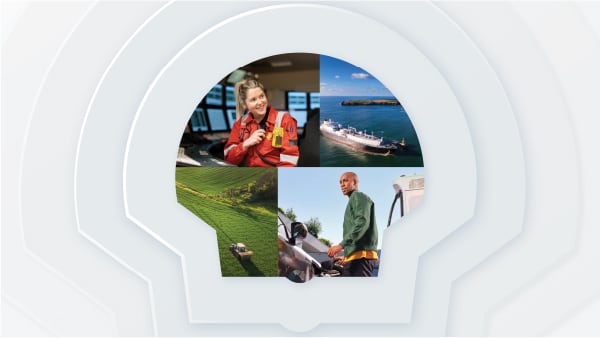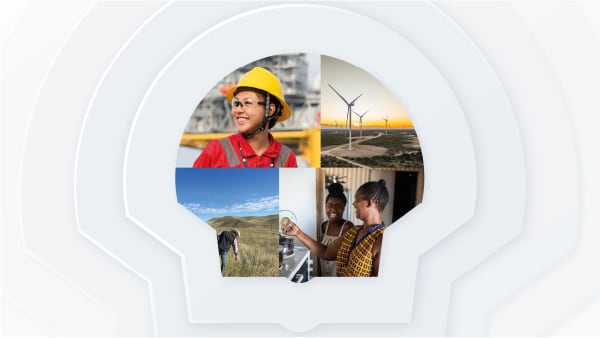Contribution to society
Shell's businesses are part of society and contribute to it by buying and selling goods and services in many countries. Our employees, suppliers and contractors are part of the local communities where we operate. Our activities generate revenues for governments through the taxes and royalties we pay and the taxes we collect on their behalf. This helps governments fund health care, education, transport and other essential services.
Payments to governments
In 2023, Shell paid and collected $67 billion in taxes* to governments. We paid $14 billion in corporate income taxes and $6 billion in government royalties, and collected $47 billion in excise duties, sales taxes and similar levies on our fuel and other products on behalf of governments.
Supply chain engagement
We continue to explore how we can source responsibly in our supply chain. In 2023, our operated and non-operated ventures spent around $48.6 billion on goods and services from suppliers around the world*.
Shell aims to work with suppliers, including individual contractors, that behave in an economically, environmentally and socially responsible manner, as set out in our Shell General Business Principles and Shell Supplier Principles. In 2023, we worked with around 25,000 suppliers globally.
Our standard contract terms require adherence to these or equivalent principles, and require contractors and suppliers to:
- protect the environment in compliance with all applicable environmental laws and regulations;
- use energy and natural resources efficiently; and
- continually look for ways to minimise waste, emissions and discharge from their operations, products and services.
Helping our suppliers decarbonise
We continually work with our suppliers to find ways to reduce greenhouse gas emissions across our supply chains. We seek to understand their energy needs and jointly identify potential low-carbon solutions that are economically sustainable. This involves using digital technology to establish transparency in energy consumption and emissions throughout our supply chain.
See our website shell.com for more information about how we engage with contractors and suppliers.
Social investment
Our activities contribute to economies through taxes, jobs and business opportunities. We also make social investments in areas determined by local community needs and priorities. These investments are sometimes voluntary, sometimes required by governments, or part of a contractual agreement. Through voluntary initiatives, we work with partner organisations to help individuals and communities access reliable electricity. In 2023, we continued to develop programmes to improve access to energy in Nigeria, Pakistan, India and South Africa.
In 2023, we spent almost $198 million on social investment, of which 35% was required by government regulations or contractual agreements. We spent the remaining $128.3 million (65%) on voluntary social programmes.
2023 Social investment spend by theme
Around $84.8 million of our total social investment spend in 2023 was in countries that, according to the UN Development Programme's Human Development Index 2021, have a gross national income of less than $15,000 a year per person.
2023 Social investment spend by region
See our website shell.com for more information about our social investment.
Engaging with communities
We engage with communities as part of our approach to managing human rights and providing access to remedy. Shell's HSSE & SP Control Framework helps us to operate responsibly and avoid or minimise potentially negative social impacts of our operations. When we divest assets or exit areas, we apply well-established processes to guide our risk assessment with the aim of leaving a positive legacy.
The requirements are supplemented by guidance that helps practitioners on the ground to engage with communities around our operations. Major projects and facilities operated by Shell have a social performance plan for managing potentially negative impacts, such as noise pollution, and maximising benefits, such as using local suppliers. These plans typically begin with defining the social environment, focusing in particular on people who may be especially vulnerable to the potential impacts of our operations. In the larger of these major projects and facilities, we implement a community feedback mechanism for listening and responding to questions and resolving complaints in a timely manner.
We have specific requirements to avoid, minimise or mitigate potential impacts on the traditional lifestyles and cultural heritage of Indigenous Peoples. We also have specific requirements to avoid, minimise or mitigate their involuntary resettlement.
Since 2020, we have used our online community feedback tool to track and respond to questions, complaints and feedback that we receive. It allows our network of 148 community engagement practitioners to document feedback and outcomes. They are the face of Shell in the communities and act as a bridge between communities and our activities.
In 2023, we increased the number of sites with a community feedback mechanism aligned with the effectiveness criteria of the UN Guiding Principles on Business and Human Rights from 16 to 20. Several more sites have other procedures in place for gathering feedback. In 2023, we received feedback at 80 sites in 26 countries.
See our website shell.com for more information about our work with communities.
Human rights
Human rights are fundamental to Shell's core values of honesty, integrity and respect for people. Respect for human rights is embedded in the Shell General Business Principles and our Code of Conduct. Our approach is informed by the UN Guiding Principles on Business and Human Rights. We work closely with various organisations to improve how we apply these UN guiding principles.
Salient human rights
In 2023, we continued to work on salient human rights issues (salient human rights are those that are most at risk from our operations). We prioritise four focus areas where respect for human rights is critical to how we operate: the workplace including labour rights, supply chain, communities and security.
Shell employees working in these focus areas need to complete mandatory human rights training. About 1,750 employees had completed the training between its launch in 2021 and the end of 2023, 94% of those assigned the training. We encourage all employees to complete the course, regardless of their role, to build greater understanding of human rights across Shell.
See the table below for examples of our salient human rights issues in each focus area.
Human rights focus areas
Salient issues
-
At the workplace
- Health and safety
- Discrimination
- Decent living conditions in worker accommodation
- Access to adequate and readily available channels to voice concerns
-
In supply chains
- Labour rights in our supply chains, e.g. prevention of forced labour, access to remedy
- Safe and healthy working conditions
- Decent living conditions in worker accommodation
-
In communities
- Social impact management
- Vulnerable persons/communities
- Land access, livelihoods and cultural heritage
- Engagement and access to remedy
-
In security
- Human rights impact on communities by private security and/or government security forces we rely on
- Security of employees and contract staff in high-risk environments where we work
For each of these areas, we have systems to identify potential impacts and to avoid and mitigate them.
For example, Shell's HSSE & SP Control Framework contains requirements that set out how we identify, assess and manage our impacts on communities where we operate, including any impact on human rights.
Our Shell Supplier Principles state that we expect our contractors and suppliers to respect the human rights of their workforce and to manage the social impacts of their activities on Shell's neighbouring communities.
We also continue to track emerging human rights and environmental due diligence legislation, and advance our efforts to strengthen human-rights-related controls in our supply chain.
Critical habitats and people
We assess the potential impacts of our activities to manage and reduce any adverse effects they may have on the environment and on communities. We apply stringent standards across all our projects and facilities, particularly when we operate in critical habitats that are rich in biodiversity and in areas of cultural significance or close to local communities, including Indigenous Peoples.
See our website shell.com for more information about our approach to human rights.
* Non-GAAP measure (see Non-GAAP measures reconciliations).









